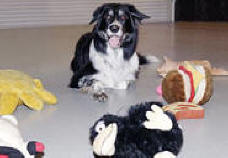The
Associated Press
Updated: 3:58 p.m. ET
June 10, 2004
WASHINGTON - As many a dog
owner will attest, our furry
friends are listening. Now,
for the doubters, there is
scientific proof they
understand much of what they
hear.
German researchers have
found a border collie named
Rico who understands more
than 200 words and can learn
new ones as quickly as many
children.
|
Border collie Rico, who can
fetch at least 200 objects
by name, retrieves a Pokemon toy
June 10 in Berlin. Rico can
figure out which objects
his owner wants even if he
has never heard the word
before.
|
Patti Strand, an American
Kennel Club board member,
called the report "good news
for those of us who talk to
our dogs."
"Like parents of toddlers,
we learned long ago the
importance of spelling key
words like bath, pill or vet
when speaking in front of
our dogs," Strand said.
"Thanks to the researchers
who've proven that people
who talk to their dogs are
cutting-edge communicators,
not just a bunch of
eccentrics."
The researchers found
that Rico knows the names of
dozens of play toys and can
find the one called for by
his owner. That is a
vocabulary size about the
same as apes, dolphins and
parrots trained to
understand words, the
researchers say.
|
Rico can learn the names of
unfamiliar toys after just
one exposure to the new
word-toy combination.
|

Rico can even take the next
step, figuring out what a
new word means.
Equivalent to
toddler
The researchers put several
known toys in a room along
with one that Rico had not
seen before. From a
different room, Rico's owner
asked him to fetch a toy,
using a name for the toy the
dog had never heard.
|
When you teach your dog a
new word, make sure "one
word means one thing."
For example, don't say,
"down" when your dog jumps
on you if you are also
teaching your dog that
"down" means to lie down on
the ground. |
The
border collie, a breed known
primarily for its herding
ability, was able to go to
the room with the toys and,
seven times out of 10, bring
back the one he had not seen
before. The dog seemingly
understood that because he
knew the names of all the
other toys, the new one must
be the one with the
unfamiliar name.
Comparative Cognitive
Function.jpg)
All such
research contributes to a
better understanding of the
true communication and
cognition abilities of
animals, and how these may
have formed the evolutionary
precursors of human
language.
If nothing
else, the experiments with
Rico the border collie
"might signal the emergence
of a vibrant area of
comparative cognition
research," writes Bloom in
his commentary. "For
psychologists,
dogs
may be the new chimpanzees.